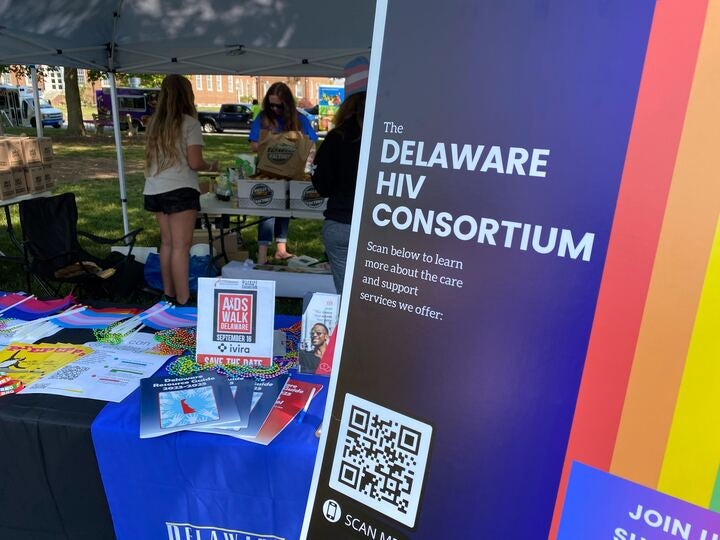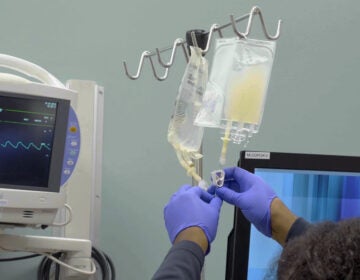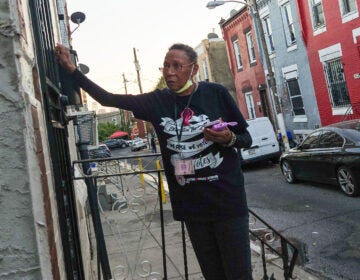Federal funding cuts threaten vital HIV prevention programs in Delaware
Delaware's HIV prevention programs face an uncertain future, raising concerns about the widespread impact on community health.
Listen 1:42
The Delaware HIV Consortium is one of several organizations and programs that could be affected by upcoming federal funding cuts. (Delaware HIV Consortium/Facebook)
From Philly and the Pa. suburbs to South Jersey and Delaware, what would you like WHYY News to cover? Let us know!
Nearly 4,000 Delawareans are living with HIV, according to the latest numbers from state health officials. For those residents and thousands more seeking referrals or treatments for STIs, the $1.8 million cut funding for HIV and disease prevention programs hits hard.
In 2020, the Centers for Disease Control and Prevention took a monumental step by integrating HIV surveillance and prevention into health departments nationwide through their Flagship funding program. This five-year initiative made $400 million accessible to state, territorial, and local health departments. Each jurisdiction was guaranteed a minimum of $1 million annually. For Delaware, that translated to $1.8 million per year.
With two years left in the five-year grant, cuts will begin next year. That’s according to Rebecca Walker, deputy director for clinical sciences at the Delaware Division of Public Health.
“These are federal funding cuts that were made to many jurisdictions across the country. This funding was a one-time funding source for us and what it is, [from] my understanding, it’s a response to the congressional needs related to the debt ceiling crisis, because of that, of course, there had to be some funding cuts made,” she said. “This is one of the programs that received some of the funding cuts as a result.”
Despite the looming loss of funding, the state acknowledges the extra money for HIV prevention has achieved significant and positive impacts in the past few years.
With support from the Flagship funding program, there was a notable expansion in early intervention services, HIV counseling, testing, PrEP referral services, condom distribution, advertising, and outreach throughout the state.
“This funding helped provide an increase in our workforce for our disease intervention specialists. And it also helped us provide resources to some of the external community-based organizations and other groups who needed a little extra help that we were able to provide at the time,” Walker said.
Delaware effectively helped more than 800 people in 2020. Fast forward to 2022, with the CDC funding, that number was around 2,200 cases. Case work included connecting individuals, particularly those newly diagnosed with HIV, AIDs, or other sexually transmitted diseases, to essential services to ensure they receive the necessary referrals, care, and treatment for their diagnoses.
“What this funding did, it allowed us to clear through a backlog of cases that were prior to COVID in 2020,” she said, but it all was possible due to new hires. “Our disease intervention specialists workforce at the time was probably less than five people.”
That backlog due to understaffing was addressed with CDC assistance, leading to the formation of a statewide workforce team of 20.
The Department of Public Health remains committed to providing prevention programs. They say they’re prepared to collaborate with other partners and pursue additional grants to ensure continuity. Walker confirms that HIV programs will continue, even if the DPH has to take the lead and handle the work themselves.
“We look to funding grants and other funding opportunities that are open to many jurisdictions across the country,” she said. “As a result of being told about these funding cuts, what we have been able to do is identify some resources in-house, we’ve doubled up some places where we were able to, we’ve reached out to other external partners to say, ‘Hey, would you be willing to take on some of this work and assist,’ and then we’ve also moved some services in-house.”
“There is still going to be HIV counseling and referral and the condom distribution program, some of the PrEP services, as well as the cluster investigations and everything else,” she said.
The state will also be able to maintain its workforce with new hires.
“We recently found out in the last couple months that we are going to be able to continue that team with that number so that we are not going to lose that workforce in Delaware and that warm handoff and that client contact will still occur,” Walker said. “So they’ll still be able to provide the counseling and the referral and be able to connect them to some of the other resources and services in the community.”
However, the greater impact falls on external community-based organizations.
“The only two contracts that we had to eliminate [were] two contracts we had with the Latin American community centers and a contract that we also had with Brandywine Counseling Community Center, and that was just for testing, HIV testing,” Walker said.
Even with some contracts still in place, substantial funding impacts are evident, raising concerns about potential disruptions in condom distribution and the potential layoff of two disease intervention specialists at the Delaware HIV Consortium.
“Just because funding is going away doesn’t mean that the need isn’t going to be there,” said Tyler Berl, the executive director of the Delaware HIV Consortium. “We’re still trying to understand the impact for our organization specifically and system-wide.”
He emphasizes the limited number of providers offering HIV risk reduction services in Delaware. He said whether organizations receive minimal or substantial funding, it will pose challenges for both community members and the organizations themselves.
“The cuts that we’ll receive this year from the amount that we had last year is about a little over 90% of reduction in funding from my HIV prevention contract previously. That’s gonna have a huge impact. It employs a couple staff members,” Berl said. “It’s our sense right now that if no funding is found then we’ll have to lay off, unfortunately, two of our key players who provide HIV prevention services in the community.”
The consortium is expecting to lay off those two employees and discontinue its “Mail Order Condom” program. According to statistics from the Delaware HIV Consortium, this decision means that 500 Delawareans, with 20% of that group being HIV positive, will no longer have access to safe sex supplies in the future.
CAMP Rehoboth is another organization that will be significantly affected, as they offer both walk-in HIV testing and a condom distribution program that distributed over 50,000 condoms this year.
While both organizations strive for equity, safe sex, and HIV/STI awareness, maintaining trust and confidentiality has always been their top priority. Berl expressed concern that these fundamental aspects are now at risk for both providers and community members seeking their services.
“We’ve spent dedicated years building relationships with these people and we’re just concerned that if services are taken out of the community, then you lose that connection, you don’t stay connected to care,” he said. “People like to feel like they have a relationship with their provider and generally you don’t have those strong feelings at the bureaucrat level.”

Get daily updates from WHYY News!
WHYY is your source for fact-based, in-depth journalism and information. As a nonprofit organization, we rely on financial support from readers like you. Please give today.







